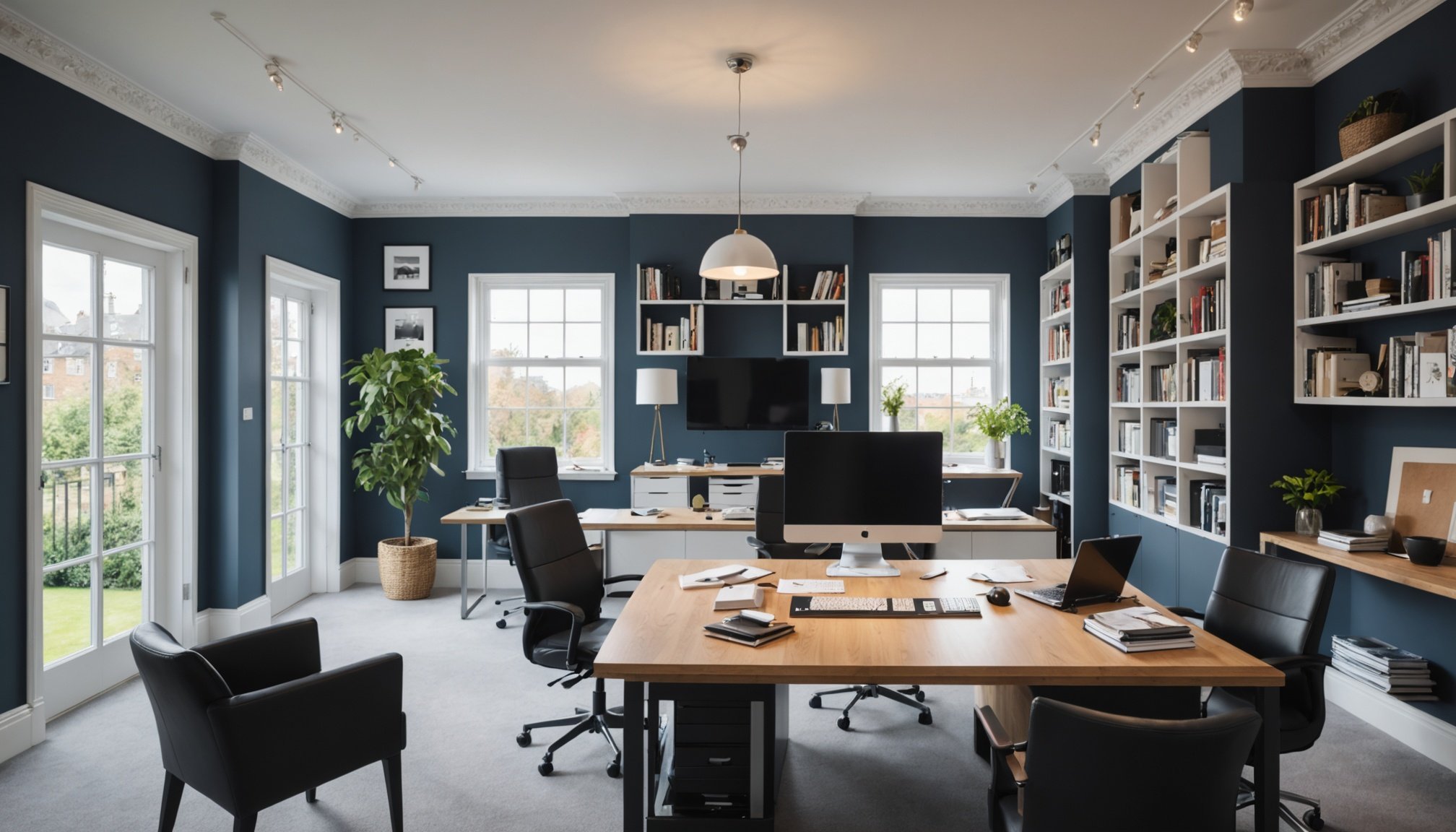Financial Benefits of a Home Office Conversion
Transforming part of a house into a home office offers enticing financial advantages. A significant motivator for many homeowners is the potential for notable savings. By reducing the routine expenses associated with commuting, such as travel costs, work attire, and daily dining, household budgets can be positively impacted. These home office conversion benefits can swiftly accumulate, providing a direct boost to your savings account.
From a broader investment perspective, integrating a home office can enhance the long-term ROI of your property. This modification may increase the property’s resale value by catering to the growing demand for adaptable living spaces. With remote work becoming more prevalent, homebuyers are increasingly prioritizing flexible working areas, which can elevate your property’s market allure.
In parallel : Essential cybersecurity measures uk homeowners must adopt for a secure smart home
The modern trend of remote work also plays a crucial role in influencing such property adaptations. As more employees and employers recognize the benefits of working from home, the substantial increase in home office conversion benefits becomes evident. These financial advantages are not just about immediate cost savings but also about leveraging long-term gains that align with evolving work trends.
Tax Implications of Home Office Conversions
For homeowners looking to transform part of their house into a dedicated workspace, understanding the tax benefits and deductions available can significantly ease the process and realization of financial gains.
This might interest you : What Role Do Brokers Play in Securing Property Credit?
Understanding Tax Deductions for Home Offices
Converting a home space into an office can make you eligible for various tax benefits. Typically, a percentage of expenses related to your home office, such as utility bills and mortgage interest, are tax-deductible. According to HMRC regulations, the proportion of your home used for business purposes determines the eligibility and extent of these deductions. Recording each business-related expense precisely is crucial for maximizing these deductions.
Navigating HMRC Regulations
HMRC regulations offer guidelines on what qualifies as a home office expense, ensuring clarity on allowable deductions. Complying with these rules can prevent potential issues with tax claims. Regular consultations with a tax professional can provide personalized advice and ensure adherence to current regulations.
Maximizing Deductions for Business Expenses
To effectively maximize deductions, maintain detailed records and receipts of all relevant expenditures. This includes percentages of space used for work, time spent, and allowable business expenses. By diligently tracking and categorizing expenses, homeowners can leverage the full spectrum of available tax advantages, seamlessly integrating the home office conversion into their financial planning.
Cost-Saving Strategies for Home Office Conversion
Creating a home office doesn’t need to break the bank. Integrating cost-effective solutions is key to keeping your project within budget while ensuring a productive environment. Begin with identifying budget-friendly design options that align with your workspace needs. Consider multi-functional furniture that maximizes utility without compromising space.
When evaluating renovations, weigh the cost vs. benefit to find the balance that accentuates your office’s core purpose while boosting your home’s overall value. Sometimes, simple home improvements such as a fresh coat of paint or smart storage solutions can have a significant impact without substantial expenses.
To minimize upfront costs, prioritize elements that enhance functionality. Opt for DIY projects when possible, and incorporate upcycled materials to give your workspace a unique touch. By focusing on purposeful spending and clever design strategies, you can achieve an efficient workspace that optimizes both practicality and aesthetic appeal.
Exploring these strategies not only fosters an inviting and functional home office but also boosts your financial savings over time. By smartly addressing the conversion process, homeowners can align their design goals with budgetary constraints, ensuring a successful and sustainable home office conversion.
Designing for Productivity in Your Home Office
A thoughtfully designed home office can significantly boost productivity. Selecting an optimal layout tailored to your specific work habits is crucial. Begin by establishing designated work zones: a primary area for tasks, a secondary space for equipment, and a relaxation nook if space allows. This clear separation can aid in delineating professional duties from personal activities.
Choosing the Right Layout
Consider the ergonomics of your workstation. An ergonomic chair and adjustable desk can prevent discomfort, enhancing your focus and efficiency. Arrange your setup to ensure ease of access to frequently used items without disrupting your workflow.
Essential Ergonomic Furniture
Investing in ergonomic furniture is essential. A chair with lumbar support and a desk at the correct height can reduce strain and improve posture. Such adjustments not only foster a healthier environment but also contribute to long-term productivity.
Maximizing Natural Light and Space Utilization
Leveraging natural light can improve your mood and energy levels. Position your desk near a window to harness this benefit. Use mirrors or light-coloured paint to reflect natural light, creating an expansive feel in smaller spaces. Thoughtful space utilization, alongside natural light use, cultivates an inviting and effective work atmosphere.
Legal Considerations and Compliance
Setting up a home office involves understanding relevant zoning laws and property regulations. Before remodeling your space, check with your local council in the UK to ensure your plans comply with zoning regulations. This step is crucial to avoid possible penalties or legal challenges later.
Converting a residential area into a workspace may also impact your insurance needs. Consult with your insurer to adjust your policy accordingly. Home office setups may necessitate increased coverage for business equipment or liability. Some policies may also require proof of modification permissions.
When planning your conversion, research local regulations thoroughly. Confirm whether your intended office use aligns with any established rules. Consider how noise levels or increased traffic might affect neighbours, which are common concerns under local ordinances.
In sum, addressing these legal areas proactively ensures a smooth transition from residential to home office environment. By staying informed about zoning restrictions, updating insurance policies, and understanding compliance requirements, you safeguard your project. These measures protect both your property investment and maintain community relations, thus ensuring your home office conversion is successful and stress-free.
Case Studies and Success Stories
When converting a part of your home into a thriving workspace, learning from others’ experiences can illuminate best practices. Numerous successful conversions reveal how homeowners have optimised spaces to achieve both personal satisfaction and financial benefits.
Inspiring Home Office Transformations
One notable conversion involved a garden shed being transformed into a fully functional office. This not only increased property value but also provided the owner with an ideal working environment. Such transformations demonstrate how creative use of existing or underutilized spaces can yield substantial returns.
Homeowner Testimonials on Returns and Experiences
Many homeowners report positive financial outcomes post-conversion. For instance, one individual noted an increase in productivity and an unexpected opportunity to rent out the space, providing additional income. Testimonials like these underline the multifaceted benefits of well-planned home office conversions, from enhanced work efficiency to improved property marketability.
Lessons Learned from Successful Conversions
Key insights from these projects highlight the significance of integrating ergonomic furniture and ensuring compliance with local regulations. Prioritising such elements can streamline the conversion process and maximize home office conversion benefits. By learning from successful conversions, you can adeptly navigate your transformation journey, ensuring a rewarding and stress-free experience.

